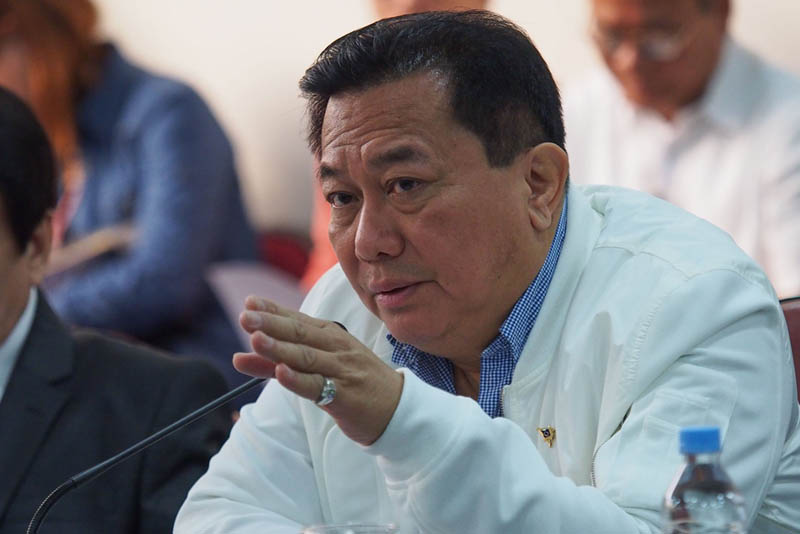House can’t bully us on Cha-cha – senators

Yesterday, Speaker Pantaleon Alvarez told new recruits of the ruling PDP-Laban that provinces opposed to federalism would not get funding from the national government. Pantaleon Alvarez/Released, File
MANILA, Philippines — There’s no way Speaker Pantaleon Alvarez can bully the Senate into agreeing to a joint session and voting with the lower house in crafting a constitution for a federal government, senators said yesterday.
Senators – both from the minority and the majority – continued to dig in to defend the independence of the Senate, which they felt was being threatened by Alvarez’s insistence that senators vote jointly with the nearly 300 congressmen on Charter amendments.
Alvarez has vowed to push ahead with the plan to convene Congress as a constituent assembly (con-ass) with or without the senators.
Yesterday, Alvarez told new recruits of the ruling PDP-Laban that provinces opposed to federalism would not get funding from the national government.
Alvarez claimed he respected the right of local officials to campaign against federalism.
“But you also have to respect my right to give you a zero budget,” he told them.
He also urged voters to shun in the next elections senators or any officials opposed to federalism.
“No amount of threats and bullying can make the Senate violate the Constitution that we all swore to uphold and defend when we took our oath of office,” Sen. Panfilo Lacson said in a text message.
He maintained that unless Alvarez yields to the letter, spirit and intent of Article 17, Section 1 of the 1987 Constitution with regard to convening a con-ass as a mode to revise or amend the Charter, “the impasse will not be resolved and nothing will prosper.”
The House earlier approved a resolution allowing Congress to convene as a con-ass in preparation for changing or introducing changes to the 1987 Constitution.
Senators maintained the Constitution was clear about the independence of the two chambers of Congress.
In a joint voting, senators said House members would surely overwhelm them. There are only 23 senators as against the almost 300 congressmen.
Senate Majority Leader Vicente Sotto III stressed the only time a joint session and approval is mentioned in the Constitution is on the declaration of martial law.
Sotto said even ordinary bills, such as renaming of schools, require the separate approval of the Senate.
He said he was not bothered by Alvarez’s attacks on senators, saying such negative campaigning would not work.
“That’s OK. I’m not worried about issues like that. I will surely campaign for my Senate lineup. I’ve been involved in 10 senatorial elections since 1987 and in my experience, negative campaigning on issues barely make a dent,” Sotto told reporters.
“On the other hand, if politicians with high trust ratings campaign against a politician directly or personally, that’s a different story,” he said.
Derailed
Senate Minority Leader Franklin Drilon said Alvarez “cannot bully the Senate and the senators will not allow that.”
“The House Cha-cha (Charter change) train will get derailed even before it leaves the station – the Filipino people will see the real plan in federalism: suspend elections, extend the terms of members of Congress and do away with the check and balance system by abolishing the Senate,” Drilon said.
“The issue at this point is the brazen move of the House to impose and railroad Cha-cha without public debate and participation,” he said.
He said senators are willing to face and defend before the people their stand on federalism.
The Senate has proceeded to deliberate on various proposals to amend the Constitution through the regular legislative route, with the Senate committee on constitutional amendments conducting the hearings.
Sen. Francis Pangilinan, who chairs the committee and belongs to the minority bloc, vowed not to rush or drag the public hearings.
“It is unfortunate that the Speaker resorted to threats and even name calling to pressure the Senate to relinquish its check and balance role as specified by our Constitution,” Sen. Sherwin Gatchalian said.
He said the hearings of the committee showed that it was not yet clear how the people would directly benefit from federalism in terms of increasing their incomes.
“The only clear beneficiaries of this endeavor are the politicians who will perpetuate themselves in power,” he said.
No connection
Sen. Francis Escudero said he has yet to see the connection between federalism and developing the countryside.
“They (advocates) haven’t even adequately discussed what type of federalism they want to pursue that will ensure this (economic development),” Escudero said.
Senate President Aquilino Pimentel III took Alvarez’s statements in stride, saying he would wait until the two chambers finish their respective work on amending the Constitution.
“The House of Representatives can do constituent assembly work on its own just as what the Senate intends to do. What is important is what the House will do with its output,” Pimentel said.
“Will the House submit it (proposed amendments) to the Senate for our three-fourths vote concurrence? Let us wait for that stage because it is in that stage that we will now have a divergence and a possible legal/constitutional issue,” he said.
On Alvarez’s call on voters not to elect candidates opposed to federalism, he said the PDP-Laban would field only candidates – from senator to councilor – supportive of federalism “because that is actually a basic requirement for party membership. That (federalism) is in our oath of membership to the PDP-Laban.”
Sen. Juan Miguel Zubiri suggested a Cha-cha summit between the two chambers so they could iron out their differences. But Pangilinan said congressional leaders may “just call each other or have coffee.”
For Sen. Manny Pacquiao, what lawmakers from both chambers should first consider is the welfare of the people.
“Whatever mode (of amending the Constitution) we agree upon, in the end it’s the welfare of Filipinos that I keep in mind so that we’ll finally attain progress in a country that is saddled with corruption,” Pacquiao said in Filipino.
Sen. Nancy Binay said lawmakers should first consider fine-tuning the implementation of the Local Government Code before eyeing Charter change in preparation for a federal form of government.
Binay said issues like decentralization and strengthening local autonomy are better addressed by strictly implementing the Local Government Code.
Sen. JV Ejercito also appealed against rushing Cha-cha. “We cannot railroad, we cannot rush a move or the process that would alter the fundamental law of the land,” Ejercito told reporters in Lingayen, Pangasinan.
He admitted there might really be a need to amend the Constitution, as “we have to keep abreast with the changing times.”
Cheaper, faster
Alvarez reiterated his preference for con-ass, saying it is cheaper and faster to organize than a con-con (constitutional convention) whose members might only advance their personal or business interests.
“I cannot see the advantage of electing a constitutional convention. If the purpose is to prevent businessmen and politicians from fielding representatives who will protect their personal interests, there is no guarantee that that will not happen,” he said.
He stressed the job of amending the Constitution should be left to lawmakers.
“We are the elected representatives of the people. We have their trust and confidence. So we might as well propose constitutional amendments, instead of electing a convention,” Alvarez pointed out. “The government would save a lot of money.”
The House of Representatives committee on constitutional amendments has estimated that electing a convention would cost taxpayers P11 billion, excluding its operational expenses.
In contrast, the committee said a con-ass would only require an additional P205 million, since the two chambers of Congress have their respective operational budgets.
“We will count the members of the two chambers, then we will get three-fourths. If we have three-fourths, then we satisfy the requirement,” he said.
He said if the Senate holds its own con-ass, “we will respect that, as long as they have the required vote of three-fourths of all members of Congress.”
Isabela Rep. Rodolfo Albano III said any senator or concerned citizen who does not agree with the position taken by the House could question it before the Supreme Court.
“The ruling of the high court will educate all of us on this issue,” he said.
Rep. Albee Benitez of Negros Occidental said the people were aware of the provision on the required vote for any constitutional amendment or revision when they ratified the present Constitution in 1987.
“Their will should prevail over any contrary view, even one coming from any member of the commission that wrote the present Constitution in 1986,” he said.
Another congressman, Lito Atienza of party-list Buhay, said con-ass is not the right way of amending the Constitution.
“Con-ass is basically wrong. We are neither constitutionalists nor legal experts to presume to amend the Constitution. This is best left in the very capable hands of delegates elected by the people in a constitutional convention,” he said.
He said lawmakers should devote their time to crafting laws instead of tinkering with the Charter.
Atienza also criticized the House for the hasty adoption Tuesday night of a resolution urging Congress to convene as a con-ass for Cha-cha.
“The House leadership cited a House rule that allowed only three speeches for and two against as their basis for terminating the period of interpellation and debate. In a chamber composed of almost 300 members, why limit the interpellations to three and two on such a crucial matter as amendments to the Constitution? That’s ridiculous and very undemocratic. Each member should be allowed ample time to raise questions,” he said.
House leaders have denied that the approval of the con-ass resolution was railroaded.
Caloocan City Rep. Edgar Erice said no Cha-cha could take place without the participation of the Senate.
Former congressman and Bayan Muna chairman Neri Colmenares also emphasized a Senate-less con-ass would be a violation of the Constitution.
“This is going to put the country on the road to a constitutional crisis just because House members want to convene a self serving constituent assembly to approve a self serving Cha-cha. It is unconstitutional for the House to convene a Senate-less con-ass,” Colmenares said.
He added that the current Cha-cha move “is no different from the House railroading of Resolution 1109 under then Speaker Prospero Nograles in 2009, which advocated the same Senate-less con-ass.”
“In the end, the move was defeated not by the Senate or the courts but by the people, including various churches which showed outrage against such a self-serving act. The people must oppose this latest ramming of Cha-cha down our throats,” Colmenares said. – With Cesar Ramirez
- Latest
- Trending































